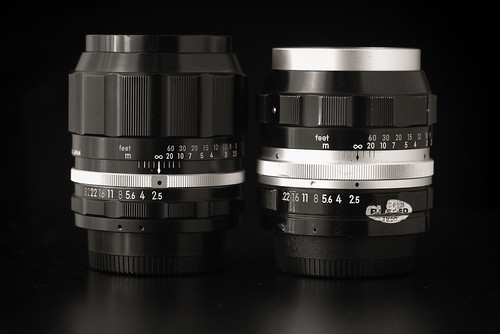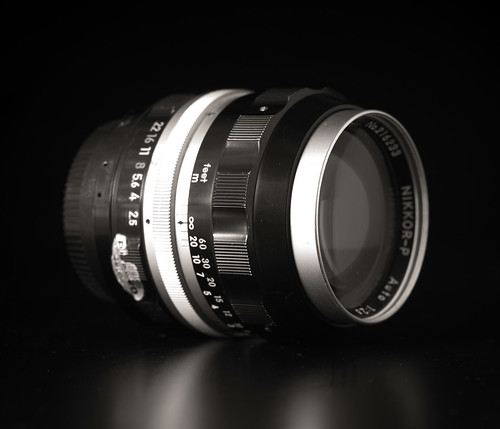In an earlier post I said "... Not that I needed a third 105mm lens or anything like that, but, apparently I needed a third 105mm lens... It appears that I'm the second owner of a gorgeous version of an updated dual rear element optic..."

The development history of the fabled Nikkor-P 105mm f/2.5 lens is well known.
I remember reading somewhere that Nikon took their c.1954 10,5cm rangefinder lens, shaved 1mm off the rear element to clear the Nikon F SLR mirror, and introduced that lens in 1966.
Nikon's own Thousand and One Nights series documents some of this from a designer perspective. They say...
"...Compared to the previous model with the [Nikkor-P early SLR] Sonnar type lens construction, [the updated Nikkor-P Xenotar type] offers significant improvements in close-range aberration fluctuation, as well as peripheral light, spherical aberration and coma. In particular, it delivers a beautiful balance of focused and defocused (blurred) images, as well as higher resolution with natural gradation. The Xenotar-type lens design with the ideal aberration correction made it the perfect lens for portraits..."

I once again have one of each version of this optic. The chrome-nose 105mm on the right in the top image is the earlier 105mm SLR single rear element Sonnar design. The black-nose 105mm lens on the left is the 1970 Xenotar update version.
Of course I couldn't help myself and I had to see if I could see these things. Additionally, I wanted to see how the two lens designs handle highlight transitions. So I selected a scene that included white screen door material and an edge of a sliding glass door. I also "Capture Sharpened" images from both lenses to see how much the software normalizes output resolution. Lastly, I wanted to confirm that in terms of "sharpness" that even 50 year old lenses can still "look good", even by today's hyper-sharp standards.
[click on the following image and enlarge to 100 percent]

Now that you've had a good squint at the output, can you tell any difference between the two? I can't. Well, maybe a little. If I really squint hard, stand on the tippy-toes of my left leg, spin counter-clockwise, and chant "lenses lenses lenses." Any minor differences are really difficult to see and might quickly be put down to focusing differences, if any.
So what have I proven? Well, both lens designs seem to render highlights very similarly. Both can be made to appear very sharp. Both handle shadow details equally well, even though they are single coated. And I can re-affirm that I like both of these lens versions equally.
This leaves me in something of a conundrum. Which lens would I carry and why?

No comments:
Post a Comment